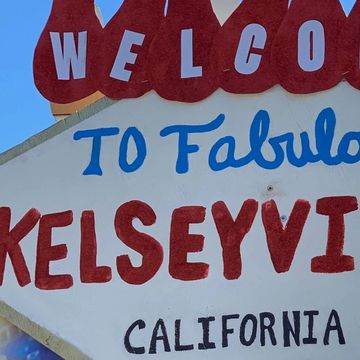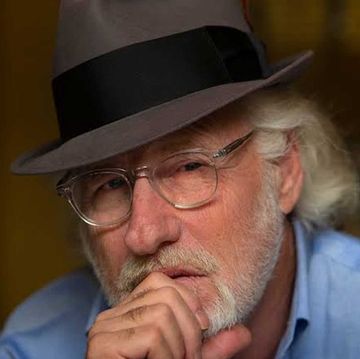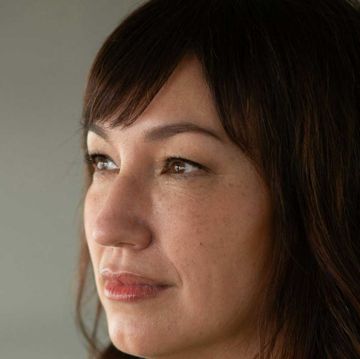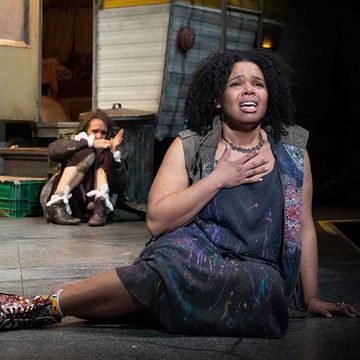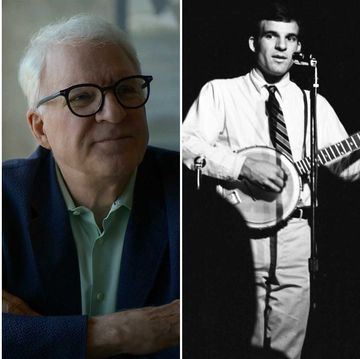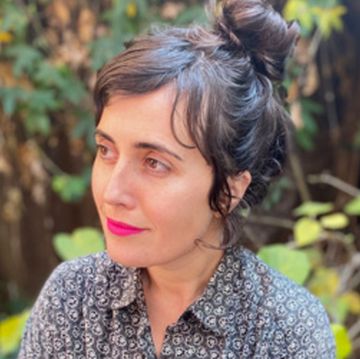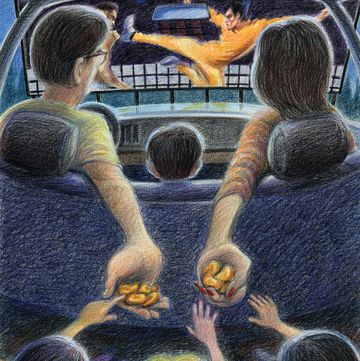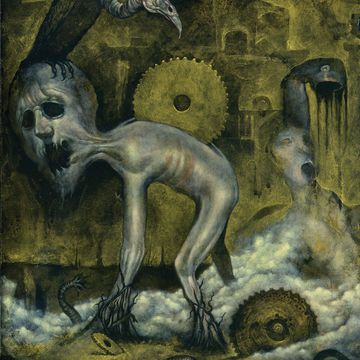Most people visit the world-famous Huntington Library, Art Museum, and Botanical Gardens in San Marino, California, to appreciate, well, the library, museum, and gardens. Two opulent metalwork gates guarded by security allow visitors into the 207-acre compound. Phoebe Bridgers, who grew up nearby, sings about hopping the fence in “Garden Song.” Unbeknownst to most visitors, however, is the entire army of so-called readers—academics (and a handful of literary authors, like me) who have been given access to the reading rooms and the stacks to write and do research. As an author who craves seclusion, I came for peace and privacy among the books, and found it in the bowels of the library. There, no one bothered me. Until, one afternoon, an older man shuffled past my desk. Our relationship was short, underground, and impactful.
Except for the 15 months it was closed during the pandemic, the Huntington has been, since 2018, where I write my novels, stories, and essays and where I edit student work (I teach in the MFA program at Antioch University). I quickly fell into the rhythm of certain rituals unique to readers: I learned to place the rare books and first editions on foam cradles—held open with hacky sack–like weights—and to delicately turn the deckle-edged pages. Two reader friends and I meet at a hallway watercooler, like office employees engaged in hushed, giddy small talk and gossip. Another reader friend and I regularly have what she terms Lunchington: tea, cookies, and/or a meal at the Huntington’s 1919 Cafe.
This article appears in Issue 27 of Alta Journal.
SUBSCRIBE
Best of all, if I’m stuck in my writing, and just for the beauty and inspirational gratification, I often leave my work and walk the grounds. At the Japanese Garden, I run my palm over the river rocks—well oiled by the thousands of hands before mine. At the Lily Ponds, I count the sunbathing turtles and commune with the sunset-colored koi. Or I meander through the museums, saying hello to the Huntington’s well-known paintings, two coupled against their will and nicknamed Pinkie and Blue Boy, who are now joined by A Portrait of a Young Gentleman, Kehinde Wiley’s swagger-rich response to the white, rococo kids.
I confess that, intrigued by the procedural formalities, at first I spent more time checking out rare books and boxes of old photographs in the Special Collections (Ahmanson) Reading Room than I did writing. My great-grandmother had worked in the chinaware department of Bullock’s Pasadena (now a Macy’s), and I combed through photographs of the old Bullock’s with various-size magnifying glasses, searching for her face among the employees. Most readers work in the less formal General Collections (Rothenberg) Reading Room, which is where I finally settled down. Yet soon I found myself distracted again, wandering the seven miles of shelves weighed down with eight million manuscripts. Many books were in the Central Basement, which is lit like a grocery store by shivering fluorescent tubes and pitch-dark in the places where the lights are off. The atmosphere is similar to a Hitchcock movie, like someone hidden in the stacks will jump out and stab you, which is probably why no one uses the seven desks scattered among them. The frigid temperature for preservation is also a deterrent, and the only sound is the hum of the air conditioner, like the air-suck noise of a stationary airplane on the runway. A few card deck–size bug traps studded with flea-size dead insects are set about on the floor, and the air has a faint musty-old-book smell. Yet I gravitated to one of the desks at the end of a stack, unofficially claiming it as my own (though who would take it?), and started to work here.
I still work in the basement; it’s where I’m writing this essay. Alone, surrounded by books, bundled in a jacket or sweater, I mutter my words on the page without seeming insane to anyone, just as I’m rereading and vocalizing my words that you’re reading right now. I dress according to what I perceive as the Huntington’s standards—no flip-flops or jeans with holes—and I often think of John Cheever in suit and tie in his office building’s basement boiler room. Occasionally, a librarian wheels a trolley past and startles at the sight of me. Or someone visits on a book quest. More than once, I’ve heard hornlike flatulence, someone believing themselves alone.
But after I first found and claimed my desk, one afternoon an older man shuffled past me. Stooped forward, his fingers clasped the other hand’s wrist behind his back. He wore stonewashed jeans, a faded Hawaiian-print shirt, and a dark jacket. He walked as if bracing against a strong wind. One of his legs dragged.
We ignored each other. But I knew that I was no longer alone, that he too had burrowed underground. Not wanting to share the basement, I felt pricks of annoyance.
One morning, I sleuthed (or should I say snooped?) and discovered underneath a corner stairwell his desk, stacked with personal items—a lamp, an assortment of pens, papers, a bookmarked copy of Graham Greene’s The End of the Affair, an anthology, spine splayed, of American literary short stories. He had a couple of bookshelves lined with tchotchkes and more titles, these about music. A vitrine housed a bongo set, a ukulele, and a stack of LPs. I cracked open a drawer filled with pens, paper clips, notepaper…
The library is strictly pencils only—it’s against the rules to even bring an ink pen inside. We store our personal items in lockers, and our bags must be shown to a security officer upon exit. Laptops and phones are permitted, and that’s about it. Why was this man afforded such privileges? Bongos? Records? Pens?
I wandered portions of the basement that have, since COVID, been locked off and found evidence of a further burrowing: a shrine to a reader long since dead. A dusty photograph pinned on the wall above a desk showed a bubbled iMac from the late ’90s, stray papers, and a mug sitting on that same desk.
The basement, I decided, draws a particular type of bird from the underbrush, like the man with the corner desk beneath the stairwell, the dead man, and now me.
For months, when the man walked past me to get to his desk, we said nothing. But we got used to each other. Then we made eye contact, which progressed to a lifted chin, a hand wave. He smiled, I smiled back. One afternoon, he said, “Nice to see you,” and I knew that he meant it. His voice had a blown-out quality, low and raspy, a British accent.
I began to look forward to his presence, albeit in passing. The knowledge that he was close by in his corner was a comfort. I missed him when he wasn’t there.
But our relationship would not have advanced had I not angered the then–general collection manager, who sent a long email on May 8, 2019, the gist of which follows:
I had occasion to be in the Central Basement of the Huntington stacks and noticed a number of volumes tucked on a shelf under the return table. On investigation there were 5 of our volumes and a number of personal books. Looking at our check-out records, 4 of our books were not checked out but the fifth one was checked out to you. I also noted that you had an assigned shelf space in our Rothenberg Reading Room. On looking at that I noted 2 volumes checked out to you but a 3rd one not checked out. At this stage I would not like to make assumptions.… I looked up your patron profile and the working topic listed was regarding Mark Twain—a totally different time period to the three books that you do have checked out.… Could you please let me know what is what. I have the unchecked books from the Central Basement shelf in my office until I can confirm their status. Many thanks.
I sought out the email’s writer, Christopher Addé, to apologize. Instead of a strict librarian, I found a snow-haired Brit with a sly sense of humor. We fell into pleasurable banter.
Before long, like a teacher linking misfits on the playground, hoping that they’ll no longer eat lunch alone, Christopher was encouraging my friendship with the basement corner desk’s longtime squatter: Ian Whitcomb.
Ian had settled into his spot at the Huntington more than 25 years before, Christopher told me. “Google him, read his work, talk to him,” Christopher said. “He’s lonely, neurotic, depressed, in despair. I worry. After his stroke in 2012, he’s not been the same.”
He explained that Ian’s song “You Turn Me On” had ridden the crest of the British Invasion to reach No. 8 on the Billboard Hot 100 chart in 1965.
“He’s a remarkable talent,” Christopher said. “A record producer—he produced Mae West!—a historian, an actor, a novelist, a radio broadcaster.”
Later that night, I YouTubed “You Turn Me On.” Watching young Ian perform with such playful mischievousness, I smiled goofily to myself. Largely improvised at the end of a Dublin recording session, the catchy and joyful song celebrates an impish and campy sexuality with a panting hunh hunh hunh hook.
I listened to his other music—ragtime, Tin Pan Alley, vaudeville. In his more sentimental and comical songs, Ian’s voice has a gentle sweetness, along with a hint of an ironic, knowing edge, upbeat yet nihilistic. I was reminded of one of my favorite scenes in a movie. As a teen, I repeatedly watched Eric Idle come out of the refrigerator in a pink suit to sing “Galaxy Song” in Monty Python’s The Meaning of Life.
Even after I googled Ian, I didn’t fully understand the extent of his career and fame. I wasn’t that interested.
Having lived in Los Angeles for almost 30 years, I’ve grown increasingly averse to fame-fawning. I know how it feels to be neglected by someone at a party, only for the same person to light up in the presence of someone more famous. Or in literary circles, more heralded. At the same time, I know what it’s like to be friends with someone well-known, and to have someone else befriend me, only to later discover that I merely served as a link to that more important person.
In other words, I find any whiff of sycophancy gross.
The Huntington hosts a Reader Coffee Hour on Tuesday mornings to encourage fraternization. It’s popular in large part because of the free cookies.
The Tuesday after my conversation with Christopher, before I could, as usual, abscond with tea and napkin-shawled cookies to a private nook, he nodded me toward a chair beside Ian. There, grinning like a giddy matchmaker, he introduced us, then said that he had to return to work. “I’m sure you’ll be good friends,” he said. “Basement buddies,” he added as he walked away.
Ian and I sipped from our paper cups. We watched the other readers stand and chatter in clusters.
I said that I’d tried to talk to the academics before. But I often found them impenetrable.
He grunted an acknowledgment.
“Their research is so specialized,” I said.
“ ‘I’m writing a series of articles analyzing every other footnote,’ ” he said, taking on the voice of an academic.
“ ‘On the pages between 374 and 431,’ ” I continued for him.
“ ‘In a manuscript that no one’s heard of,’ ” he concluded.
We chuckled gravely, our eyes on the academics. I had to lean forward to hear him: That one had left his wife, he said, and that one was stupid, avoid that one for sure, that one specialized in arcane medieval history, and that one had been fired from a university and lived off his wife’s inheritance.
Then Ian said that his wife, Regina, had complained that he’d left the screen door open that morning.
“How long have you been married?” I asked.
“A century,” he said.
He came to the basement every day to give Regina a break.
“She says it’s good for me to get out of the house,” he said.
A pang of support for Regina went through me.
He asked whether Christopher had told me about his stroke.
“Yes,” I said.
“I used to write,” he said. “I’ll give you my books. Now all I do is read.”
I said that he could dictate another book. There was technology.
“My life’s over,” he countered, peering at me. His head dropped. “I can’t play music.” He paused and looked up. “I’m so sad.”
“So’s everyone. To some extent.”
“Maybe,” he said. “I don’t know.”
He asked whether I’d be here tomorrow.
I said yes.
Early on, a writer friend said she’d been to a few parties with Ian and warned: “I think he’s the typical narcissist-male-artist type. Be careful.”
She might’ve been right, but nevertheless we became friends. Underground, Ian stood beside my desk or I stood beside his, and we talked quite a bit.
Often I tried to cheer him and convince him that he could begin another project. He was generous, asking questions, interested in what I said.
He went on obsessive rants. For instance, when he had a flight to a music festival, he couldn’t stop worrying about making it to the airport in time, Regina driving him.
I suggested he try meditation. He scoffed at the idea.
The few times we hugged, I worried about his neglected hygiene.
More than once, Ian said, “Maybe we could get coffee tomorrow,” and I said, “I’d like that.”
We’d agree to meet at 1919 Cafe, but he would never show up—a relief. Neither of us wanted to take our relationship aboveground.
All he did was read literature. He loved short stories, so I gave him my story collection The Secret Habit of Sorrow.
After he read it, he said that I was “the real deal.” I’m usually uncomfortable with both praise and criticism. But his matter-of-factness put me at ease.
“You write children and old people well,” he observed. “And you write a lot about addiction.”
I said that I’d been sober for some time.
“From what?” he asked.
“Alcohol,” I said.
“I don’t drink anymore,” he said. “The doctor told me not to,” he added, looking unconvinced or perhaps apathetic.
He was proud of his liner notes for his CD Titanic: Music As Heard on the Fateful Voyage, which he gave to me along with two of his books, Resident Alien: The Hilarious Adventures of a Public School Man in Wildest California and Lotusland: A Story of Southern California. I gave him my first story collection, Drift.
He gave me his CD Old Chestnuts & Rare Treats. His full-throated, carefree voice singing upbeat songs was a delight. I was used to his feathery voice, which had a distinct charm of its own, as if each time he spoke, he was telling secrets.
We often discussed the will to live. He admired what he called the Stoics’ philosophy of “the door is always open,” meaning that the suicide option is always there, since your life is no one else’s—it’s yours to do with what you need to do. He said that this awareness paradoxically relieves one of that option.
I said that our lives aren’t just ours, that in a large sense, we belong to one another, our lives reciprocal, interconnected things.
He agreed that in many ways suicide is the most selfish act possible, because it does irrevocable damage to the people left behind.
“You’re making my point,” I said.
“You’re welcome,” he said.
He said that the glories of adulation meant nothing in the end. Once his ability to free himself in his music was removed, he became inconsolable. “It was never about fame for me,” he said.
In November 2019, Ian disappeared from the basement. I found out that he’d been admitted to the hospital.
After New Year’s 2020, I heard from Christopher that Ian was now in rehab. “Regina said he was very grumpy,” Christopher informed me via email. “I think I would be too.”
Not long after, Christopher, a reader friend, and I had a prophetic conversation at the hallway watercooler about our COVID fears. Less than two weeks later, our reader privileges were suspended indefinitely, and soon after, the Huntington shuttered its doors.
Christopher emailed on April 19 to say that Ian was in a convalescent hospital with serious health complications, and wrote again the following day, because Ian had passed away.
Fifteen months later, in July 2021, reader privileges resumed at the Huntington. The first place I went to was Ian’s basement desk under the stairwell. He’d been erased. No bongo drums, ukulele, all his personal items gone. I checked the drawers. Nothing.
When I saw Christopher, he said that he’d boxed everything to return to Regina.
It seems inevitable that I took over Ian’s desk. After a few months, Christopher propped a photograph against the wall above it. Ian wears a scarf decorated like a keyboard. He holds a ukulele, and his straightforward stare seems slightly demonic. Christopher wrote, hello, good friend! So glad that you are keeping my desk in use. Territorial, I told him that he should change the wording to say hello, tory!, and when he didn’t respond, I said that that was how I read it in my head anyway.
One morning, I went to the basement and found author, critic, and California historian David Kipen settled at Ian’s desk, which I’d unofficially claimed, though there are no rules. I stared at him until he noticed me. Perhaps I was glaring. You’d have to ask David.
Soon after, by happenstance, Christopher, David, and I had a conversation in the basement, which included a discussion about Ian’s friendship with me.
Though I never asked David not to sit at Ian’s desk, he’s since taken to the desk where I used to work. We greet each other with pleasantries. Sometimes he listens to music. He checked with me early on to make sure the noise didn’t bother me. We’re far enough away from each other that even if I listen hard, all I hear is a soft hum.
In addition to muttering my words on the page, I talk to Ian. In the beginning, I also complained. I told him that I’d had my ass whooped. The pandemic, politics, family issues, estrangement from my mother, the suicides of friends, one especially close to me, another longtime friend and neighbor’s death, and his. While protesting for racial justice in my hometown, my friend and I had been spat on by a racist career criminal. My friend had been assaulted twice more, and the City of South Pasadena had failed us. I’d written a novel that my longtime editor had rejected. Let’s be honest: he hated it. “I’ve changed,” I said. “I can’t find my way.”
In my imagination, a more earnest, life-affirming Ian told me to relight my pilot light. Remain curious, he said. Focus on art and nature. Sure, you’ve been through a lot, so has everyone, but go on living. More than that, live well! That way you can die well, too! Rather than worrying about your significance, focus on the value of life. It’s the ultimate passage, he said, and this is what to do. Edge forward little by little. Take the steps. Don’t be afraid to look down. Sure, there’s an abyss right under your feet. Be foolhardy and willing to risk. Surprise yourself and throw caution aside. Of course you’ll fall, he said. Do so with vigor. Fall, and enjoy the privilege of being permitted to exist. The reward, he said, is being alive.•
The author of three novels and two story collections, Victoria Patterson lives with her family in South Pasadena and teaches fiction in Antioch University’s master of fine arts program.








